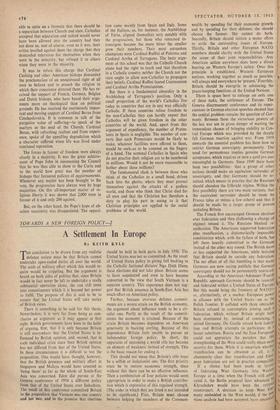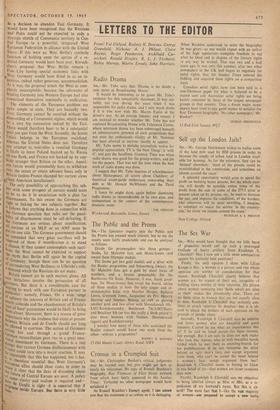TOWARDS A NEW FOREIGN POLICY-2
A Settlement In Europe
By KEITH KYLE
HE conclusion to be drawn from any realistic I defence review must be that Britain cannot undertake open-ended duties all over the world. The scale of military effort which this would re- quire would be crippling. But the argument is heard on both sides of politics that, since Britain would in fact never be left to undertake a really substantial operation alone, she can still enter into commitments which it is beyond her power to fulfil. The purpose of this is said to be to ensure that the United States will take notice of British views.
There is something to be said for this thesis. Nevertheless, it is very far from being as con- clusive an argument as it may appear at first sight. British governments have been in the habit of arguing, first, that it is only because Britain is still everywhere that the United States is in- fluenced by British opinion, and, second, that in each individual crisis since Suez British opinion has not differed from that of the United States. In these circumstances it is difficult to test the proposition. One would have thought, however, that the British presence and military effort in Singapore and Malaya would have counted as 'being there' as far as the whole of South-East Asia was concerned. Eden did pursue at the Geneva conference of 1954 a different policy from that of the United States over Indochina.
The result of Britain
conference committed Britai to the proposition that Vietnam was one country and not two, and to the promise that elections
should be held in both parts in July 1956. The United States was not so committed. As the result of United States policy in giving full backing to the Catholic factional dictator Ngo Dinh Diem, these elections did not take place. Britain seems to have acquiesced and even to have become converted to the view that South Vietnam is a separate country. This experience does not sug- gest that British presence in South-East Asia has much effect on American policy.
Further, because overseas defence commit- ments are a severe strain on the British economy, the argument about influence tends to be a cir- cular one. Partly as the result of the commit- ments the economy is strained. Because of the strain Britain becomes dependent on American generosity in backing sterling. Because of this dependence Britain feels unable to pursue an independent foreign policy. In short, the apparatus of sustaining a world role has become an element of weakness instead of strength. This is the basic reason for ending it.
This should not mean that Britain's role must be a selfish or isolationist one. The first priority must be to restore economic strength, since without this there can be no effective influence. Then a combination of four policies would seem appropriate in order to make a British contribu- tion which is expressive of this regained strength. (The order in which they are listed is not intended to be significant.) First, Britain must choose between helping the members of the Common-
wealth by spending for their economic growth and by spending for their defence; she should choose the former. She cannot do both. Secondly, Britain should initiate a major effort to settle the outstanding issues of Europe. Thirdly, Britain and other European NATO members should clarify with the United States the scope of their joint responsibilities. Any American action anywhere does have a direct bearing on Western Europe's safety. Once this principle is established, Western European nations, working together as much as possible, will always and everywhere be 'present.' Fourthly, Britain should be energetic in advancing the peace-keeping functions of the United Nations.
There is space 'here to enlarge on only one of these tasks, the settlement of Europe. The Geneva disarmament conference and its reper- cussions in German election speeches showed that the central problem remains the question of Ger- many. Between them the victorious powers of the last war are in ,grave danger of wasting the tremendous chance of bringing stability to Cen- tral Europe which was provided by the deeply felt German reaction against war. From 1919 onwards the essential problem has been how to restrict German sovereignty permanently. The need for permanence implies genuine German acceptance, which requires in turn a quid pro quo meaningful to Germans. Since 1949 there have been two possibilities: that a group of other nations should make an equivalent surrender of sovereignty, and that Germany should be re- united, which means in practice that the Russians should abandon the Ulbricht regime. Within the first possibility there are two main variants, that the equivalent surrender should be made by France (plus or minus a few others) and that it should be made by a larger group of powers including Britain.
The French first encouraged German idealism over federation and then (following a change of regime) vetoed it. The Russians blocked re- unification. The Americans supported federation plus reunification, a diplomatically impossible combination which, with the failure of both, has left them heavily committed to the Germans instead of the other way round. The British more or less supported the Americans, while insisting that Britain should be outside any federation.
The net effect of all this fumbling is that manY Germans are now saying publicly that German sovereignty should not be permanently restricted. According to the American / Adenauer/Fourth Republic approach Germany should be reunited and federated within a United States of Europe.
But this would bring the frontiers of NATO' or, alternatively, of a nuclear European power
in alliance with the United States---up to the Polish frontier. It collided with three obstacles. Britain refused to contemplate joining such a federation, which without Britain might have been dominated by, instead of containing, a united Germany. De Gaulle vetoed both federa- tion and British attempts to participate in looser substitute. Russia and the East Europeans could not appreciate the paradox that this strengthening of the West could really mean mi' security,for them. While it is uncertain whether reunification can be obtained at all, if i5
abundantly clear that reunification and Euro'
pean federation are not in practice compatible. If a choice had been made in favour of federating West Germany into Western Europe at a time when the French still ac1"°' cated it, the Berlin proposal later advanced 1/9 Khrushchev would have been the rational counterpart. A decision to keep West 06 ti many embedded in the West would, if the Preej vious analysis had been accepted, have amount
tl I!
b
li
If.
It
to a decision to abandon East Germany. It
would have been recognised that the Russians and Poles could not be expected to cede a strategic stretch of Communist territory in Cen- tral Europe to a powerful. integrated West European Federation in alliance with the United States. If this were so, West Berlin's symbolic function of holding open the option of a re- united Germany would have been over. Khrush- chev's proposal that West Berlin remain a Free City having special economic links with ,West Germany would have fitted in as an in- genious, indeed rather generous, accommodation. As it was, the proposal struck the West as com- pletely unacceptable, because the advocates of binding Germany into Western Europe had also committed themselves repeatedly to unification.
The elements of the European problem are quite simple to state. They are basically two. First, Germany cannot be reunited without the dismantling of a Communist regime, which would be a very big concession indeed by the East. There would therefore have to be a substantial quid pro quo from the West. Secondly, the Soviet Union belongs to the European mainland. Whereas the United States does not. Therefore any attempt to neutralise a reunited Germany is likely to leave Poland backed up by Russia one flank, and France not backed up by any- body stronger than Britain on the other. Ameri- can forces would presumably have to withdraw 43„ver the ocean or retain advance bases only in Britain (unless France changed her current views about American installations).
The only possibility of approaching this sub- ject with some prospect of success would seem
/ to be to do it in association with a plan for disarmament. To this extent the Germans are right in linking the two subjects together. But it follows that anything done in connection with i 1,11e German question that rules out the possi- bility of disarmament must be self-defeating. If the Germans are serious about reunification, 4'1notions of an MLF or an ANF must be r, on one side. The German government should e reminded that very great sacrifices will be s required of them if reunification is to stand
chance. If they cannot contemplate such sacri- ;Ices, the West cannot be expected to support
myth that Berlin will again be the capital of Germany, though there can be no question ct surrendering West Berliners to Ulbricht's rule, a demand which the Russians do not make. Britain cannot act in such matters alone. All new initiatives involve the persuasion of all sPartbers. But there is a considerable case for :eking to work with one European partner in r f particular : namely, France. On a wide range ul subjects the interests of Britain and of France nearly coincide and the abandonment of Britain's them of Suez' pretensions would be likely to bring te je_eln closer. Moreover, there is a reason of great importance why the coolness that exists at present b_ between Britain and de Gaulle should not long allowed to continue. The notion of Germany s`iving her soul through a grand Franco- tio Ilan reconciliation gave rise to a great emo- Ittrial investment by Germans. There is a real trnriger that current German disillusionment with b 'nee could turn into a major reaction. It may 1te :regrettable that this has happened, but it has. N therefore essential that West Germany's '111.°13ean allies should close ranks in order to '1'44_ „ it clear that the days of dreaming about o1 v future of Central Europe are over. A policy o__ he me clarity and realism is required and— re dee inside is right it is essential that it "iginat • nside Europe. But there is very little







































 Previous page
Previous page